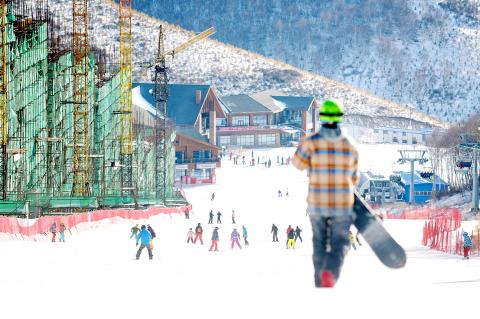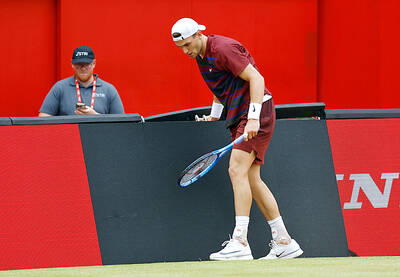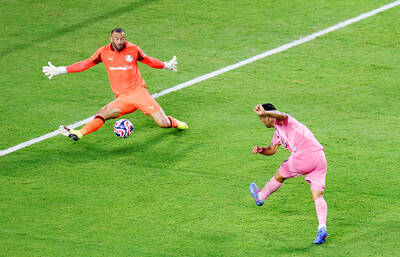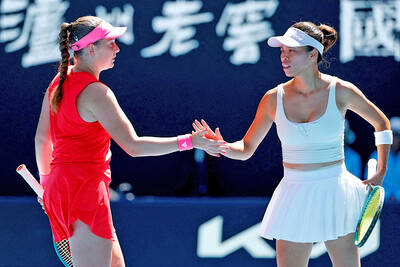High on a barren mountainside, a red flag marks the spot where China hopes ski jumpers will launch themselves to glory at the 2022 Winter Olympics.
However, hosting the Games would require a giant leap of its own.
For now, the bitterly cold valley is home to Taizicheng, a sleepy community of about 100 houses where traditional Chinese music drifts on the biting wind. On the opposite hillside — where biathletes would race and shoot — peasants weighed down by loads of firewood are the only sign of life.

Photo: AFP
According to Beijing’s bid document, the site would see 30 gold medals decided in Nordic skiing events, and become the base for a bustling Olympic village, complete with a newly erected bullet-train station.
Six months ahead of the International Olympic Committee making its decision, Beijing 2022 has emerged as the front-runner in the race after a string of European cities withdrew, leaving it facing off against only the Kazakhstan city of Almaty.
The Chinese capital has financial muscle and the kind of political support that only a one-party state can provide, and officials say public backing is overwhelming.
However, the country has few top-class facilities for outdoor events, little snow in the bid area and even less of a tradition in winter sports. Only about 1m of snow falls annually in the mountains north of Beijing, leaving an average depth of 21cm in Zhangjiakou, the city which includes Taizicheng, and just over 5cm in Yanqing, where the alpine skiing events would be held.
“I think from a natural conditions point of view, this is definitely not the best place to have a big winter activity, at least for snow sports,” said Fabio Ries, general manager of the nearby Dolomiti Mountain Resort.
However, officials have outlined a bold plan to carve world-class skiing facilities into desolate mountainsides and weave a bullet train system through the rugged terrain — and they claim to be confronting the notorious smog of China’s northern rustbelt.
According to the bid document, if Beijing wins, a new resort will be built on Yanqing’s Xiaohaitou Mountain, including a piste with a vertical drop of 830m, just scraping in over the International Ski Federation’s minimum for a top-class men’s downhill race.
It will have an elaborate artificial snow-making system and be a tourist destination “on a par with Tokyo’s Fuji,” Beijing planning official Ma Jinghua said.
Yanqing would also construct a bobsleigh track. There is virtually no bobsleigh infrastructure in China at present, nor does it have a national team.
Chinese President Xi Jinping has said 300 million new winter sports enthusiasts will be created on the back of the Games, a new generation of skiers and skaters that Beijing vice mayor Zhang Jiandong described as a “contribution to the Olympic movement.”
“Our existing national conditions and facilities will meet the requirements of the Winter Olympic Games,” Zhang said, but admitted that the pollution which regularly blights northern China remains an issue.
Authorities have in the past ordered widespread factory closures to ensure clear skies for major events, but last year a stage of the Tour of Beijing cycling race between Chongli — the county that includes Taizicheng — and Yanqing was cut short because of the smog.
“We say that we will spare no efforts to improve the air quality,” Zhang said. “We still need the blessing from heaven, and many people wonder if we can get that luck.”
Beijing would become the first city to host both the summer and winter Games if it won the bid, with the Chinese capital itself hosting the ice sports.
A total of 11 venues from Beijing’s spectacular 2008 Olympics would be put to use, including the Bird’s Nest Stadium for the opening and closing ceremonies, and the Water Cube for curling.
Authorities say using existing venues would help the candidate city keep to a slender budget of US$3.9 billion, a fraction of the US$51 billion Russia spent on last year’s Sochi Winter Games.
However, much of the infrastructure improvements are not included in the total costs, including a high-speed rail line — to be built in any case — which will cut travel times between Beijing and Zhangjiakou, about 200km away, from more than three hours to a mere 50 minutes.
There were “pros and cons” over holding the Games, Ries said, who has been involved in skiing in China since 1985.
However, the mountain resort manager raised concerns over a tendency for Olympic hosts to build new facilities where none previously existed and there was no demand, “especially some sports which are commercially a nonsense like bob-sledding, skeleton, ski-jumping and so on.”
“For some disciplines, you can’t move mountains,” Ries added.

While British star Jack Draper spent the past week trying to find rhythm and comfort in his first grass tournament of the season at the Queen’s Club Championships in London, Jiri Lehecka on Saturday bulldozed everything in his path. After more than two furious hours of battle, their form was reflected in the final scoreline as Lehecka toppled a frustrated Draper, the second seed, 6-4, 4-6, 7-5 to reach the biggest final of his career, against Carlos Alcaraz. Lehecka is also the first Czech to reach the men’s title match at Queen’s since Ivan Lendl lifted the trophy in 1990. Draper, who

REUNION: Former Barcelona players Luis Suarez, Lionel Messi, Sergio Busquets, Jordi Alba and Miami coach Javier Mascherano are to face their former coach Luis Enrique Inter Miami’s Lionel Messi faces a tantalizing reunion with former club Paris Saint-Germain in the FIFA Club World Cup last 16 after both sides on Monday progressed to the knockout phase. Miami drew 2-2 with Palmeiras to go through second in Group A, after the Brazilian side fought back from two goals down to seal top spot. They now face an all-Brazil clash against Botafogo, who lost 1-0 to Atletico Madrid, but progressed from Group B in second at the expense of the Spaniards. Champions of Europe PSG won the group with a 2-0 victory over Seattle Sounders, paving the

Dale Earnhardt Jr might already be NASCAR’s most popular crew chief. He is certainly an undefeated one. Pressed into unexpected service, Earnhardt on Saturday called the shots for 18-year-old prospect Connor Zilisch in the No. 88 Chevrolet, as they landed in victory lane in the second-tier Xfinity Series race at Pocono Raceway. “It felt good to have some input and decisionmaking power,” Earnhardt said. “And then helping Connor understand what our plan was so he knew when to push and what he was expected to do.” Earnhardt — who won NASCAR’s most-popular driver award 15 times — made a pit stop from his

Taiwanese women’s doubles star Hsieh Su-wei and Australian teenager Maya Joint on Tuesday eased into the Eastbourne Open quarter-finals in England as Hsieh prepares for the Wimbledon Championships next week. Four-time Wimbledon women’s doubles champion Hsieh and 19-year-old Joint fired two aces and converted five of eight break points to defeat Japan’s Shuko Aoyama and Poland’s Katarzyna Piter 6-3, 6-3 in 58 minutes on the grass court. Hsieh and Joint are today to face fourth seeds Barbora Krejcikova of the Czech Republic and Latvia’s Jelena Ostapenko, who advanced on Monday with a 6-4, 6-3 victory over Quinn Gleason of the US and